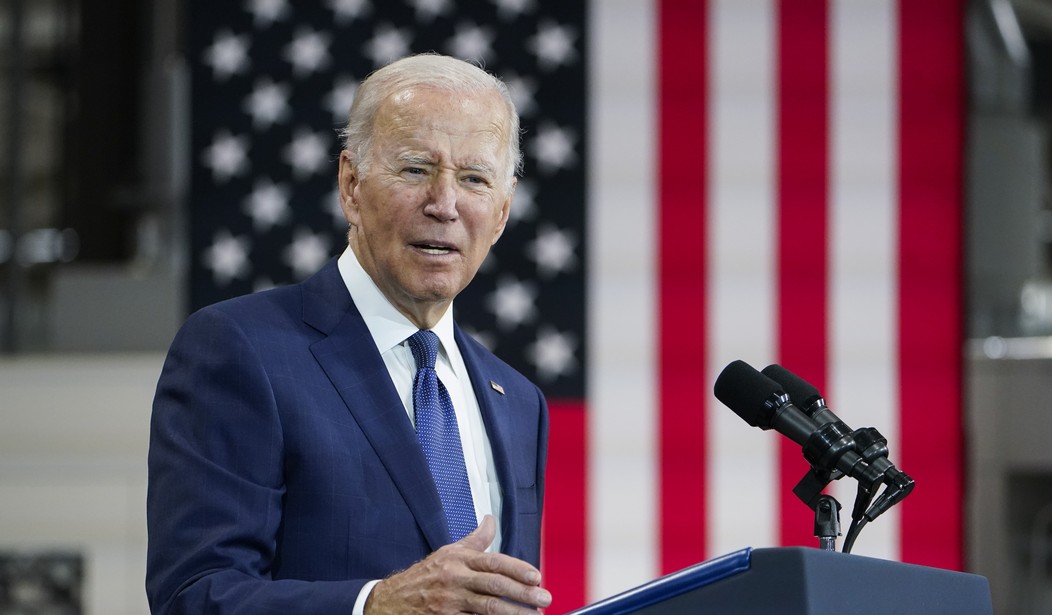President Joe Biden has repeatedly claimed that his administration's economic policies have helped to reduce the federal deficit, even though those very spending-happy measures have contributed to rampant inflation as Americans are bracing for a seemingly inevitable recession. Economic analysts have observed that Biden's regurgitated rhetoric on the deficit reduction is yet another self-congratulatory distortion of reality. Here's how:
Biden's Misleading Deficit-Reduction Boast
Biden has touted the declining federal budget deficit as purported evidence that he is taking steps to combat America's sky-high inflation. But, as usual, there are plot holes surrounding Biden's self-proclaimed victory.
As recent as Friday, during his remarks on the better-than-expected May jobs report, Biden took credit for reducing the deficit—when the money going out (government spending) exceeds the revenue coming in.
"Under my predecessor, the deficit exploded, rising every single year he was in office. Under my plan, we're on track to cut the federal deficit this year by $1.7 trillion. You hear me now? This year by $1.7 trillion. That's a fact. The largest decline in American history," Biden said in boardwalk-lined Rehoboth Beach after retreating to his Delaware vacation home for an extended weekend getaway. Biden further claimed that the deficit progress is "not pre-ordained" and, instead, part of his "economic strategy built into our historic recovery."
President Biden: "Facts matter. Under my predecessor, the deficit exploded, rising every single year he was in office. Under my plan, we're on track to cut the federal deficit this year by $1.7 trillion. That's a fact. The largest decline in American history." pic.twitter.com/drFT5QrplH
— The Hill (@thehill) June 6, 2022
Biden has been repeating this tiresome claim throughout the spring as the 2022 elections approach.
"Let me remind you again: I reduced the federal deficit," Biden asserted in a May 4 speech. "All the talk about the deficit from my Republican friends, I love it. I've reduced $350 billion in my first year in office. And we're on track to reduce it, by the end of September, by another 1 trillion, 500 billion dollars—the largest drop ever."
President Joe Biden delivers remarks on the US economy.
— Newsmax (@newsmax) May 4, 2022
"Let me remind you again, I reduced the federal deficit- all the talk about the deficit [by] my Republican friends, I love it. I reduced it $350 billion in my first year in office."
MORE: https://t.co/Gvm9VipsOb pic.twitter.com/zC83ymHBYS
Recommended
The numbers Biden referred to, including the almost $360 billion drop and the $1.5 trillion projection for 2022, were accurate. In fiscal year 2021, when the federal government spent $2.77 trillion more than it collected, the deficit was approximately $360 billion lower than the $3.13 trillion deficit in fiscal year 2020, former President Donald Trump's final full fiscal year. (Trump's deficit in FY 2020, caused by an explosion of short-term pandemic spending, had hit an all-time record, skyrocketing to more than triple the deficit than the prior year).
However, while the federal deficit did indeed decline during fiscal year 2021—which ran through September of last year, a transitional period that included Biden's initial eight months as president—the reduction was expected to be greater than the figure Biden cited. At the beginning of Biden's tenure, the nonpartisan Congressional Budget Office (CBO) predicted last February an over $870 billion decline, an estimation Biden's administration has fallen far short of. In fact, the deficit is much larger under Biden than the CBO projected it would be if the current administration had just kept Trump-era laws that were in place when his Republican predecessor left the White House and if the federal government did not implement new sweeping policy.
Before any of Biden's fiscal policies were enacted, the CBO projected a budget deficit of about $2.3 trillion in 2021, precisely $874 billion less than the shortfall recorded in 2020, which was assumed based on no new changes in federal law. Deficits were expected to fall again to a $1.1 trillion deficit in fiscal year 2022.
So what lessened the deficit disparity between Trump's time and Biden's reign? The money trail can be traced back to Biden-branded legislation like the $1.9 trillion American Rescue Plan as well as the infrastructure bill—both of which came with expensive price tags. Biden's monstrous COVID-19 relief package fueled inflation when it pumped money into the U.S. economy at a pivotal time when the labor market was beginning to recuperate and businesses shuttered by the lockdowns were starting to reopen. Many are now realizing there's no such thing as a free lunch as Americans are contending with the financial repercussions of Biden's massive social spending agenda, which injected a torrent of money into an overheated economy.
Much of the shrinkage, though, could be attributed to expiring pandemic programs, such as enhanced unemployment benefits and recovery rebates. The key factor at play is the ending of temporary pandemic stimulus expenditures. So, the deficit would have fallen more on its own if not for government intervention.
Also, Biden's deficit decline from unprecedented 2020 levels does not mean the federal deficit is low by historical standards; it still remains high compared to pre-pandemic levels. The nearly $2.8 trillion deficit in fiscal year 2021 under Biden is the second-largest deficit on record in U.S. history and three times the $984 billion deficit recorded in 2019. In addition, if the fiscal year 2022 deficit does result in a $1.5 trillion dip, the number would still be among the largest ever. (According to the CBO's latest May baseline projections, under the current laws, the budget deficit in 2022 will be $1.0 trillion, which is $1.7 trillion less—as Biden now says in June—than last year's shortfall "as spending in response to the pandemic wanes and revenues increase.")
That's also a significant rung above the fiscal year 2022 deficit that the CBO forecasted during the early days of the Biden presidency. Thus, an under-par deficit (meaning one that's higher than what was assessed) in fiscal 2021 lays the framework for what sounds like (but not looks like) a drastic reduction in the fiscal 2022 deficit.
Data visualization created by budget hawks at the beginning of April best illustrates how Biden's FY 2021 deficit and FY 2022 estimate are not really anything to applaud in comparison to the bigger picture.
3?? Absent from the President's #budget is the core of his agenda: policies that comprised #BuildBackBetter – representing trillions in costs + offsets – are represented by a deficit-neutral placeholder. Ultimately, a budget with an absent agenda is rendered somewhat meaningless.
— CRFB.org (@BudgetHawks) April 1, 2022
(By the way, the CBO's predictions are not to be interpreted as an unforgiving crystal ball providing black-and-white insight into America's economic future. Rather, the number-crunching agency's long-term projections serve as a baseline for measuring the effects of legislative proposals over the years and how Congress, as well as the White House, have influenced budgetary trends through shifting policy changes.)
Claiming that "America is on the move," (although it would be more appropriate to say that "America is in recovery" and fighting to return to the status quo), Biden insists that his administration extensively reduced the annual gap after Trump blew out the deficit on pandemic spending to combat the impact of the COVID-19 shutdowns. In actuality, Biden's government simply spent relatively less than the previous fiscal year.
The difference is exaggerated as well since Biden's colossal Build Back Better plan was a bust (for now) thanks to moderate Democrat Sen. Joe Machin (D-WV), who has acted as a key swing vote in the Senate.
Last year, we reduced the deficit by more than $350 billion. And now under my budget, we’re on track for the largest one-year reduction in the deficit in U.S. history.
— Joe Biden (@JoeBiden) April 3, 2022
America is on the move. pic.twitter.com/8TbMH4BJ1z
Economic Experts 'Scoff' At Biden's Brag
CNN's political fact-checker Daniel Dale even pushed back against Biden's argument, revealing that some economic experts on fiscal policy have "scoffed at the idea" that Biden is "personally responsible" for the deficit's decrease. Committee for a Responsible Federal Budget (CRFB) senior vice president Marc Goldwein told Dale that the president's claim is "almost bizarro world," a reversal of reality that misrepresents the current situation. According to Goldwein, the federal deficit would have fallen by a higher amount "had President Biden come to office and not done anything." Moody's Analytics senior director Dan White, whose Wall Street financial research firm's analysis Biden has lauded multiple times during presidential remarks, said the "actions of the administration and Congress have undoubtedly resulted in higher deficits, not smaller ones."
"It’s pretty silly," CRFB's Goldwein said of Biden's deficit-cutting claims, according to FactCheck.org. "[Biden] didn't cut the deficit[;] he increased it." Goldwein noted that if the Biden administration "had done nothing, deficits would have fallen by $1 trillion," adding: "They fell by much less than they were going to."
In a fact sheet on Biden's proposed 2023 budget, the White House boasted about "the President's strategy to grow the economy from the bottom up and the middle out and his effective management of the American Rescue Plan—a strategy that was built on smart, fiscally prudent investments that helped jumpstart our economy." An April report by CRFB, titled "No, President Biden Has Not Implemented Historic Deficit Reduction," dismantled the White House's "misleading" argument, approximating that "at least $2.5 trillion has been added to deficits through 2031 over the President's term so far." Annual deficits will be stuck above pre-2020 levels over the next decade and reach $2.3 trillion by 2032 under Biden's budget, according to the CRFB.
I was pretty close here. CBP projects debt will fall from from 99.6% of GDP to to 96.0%, before rising to 109.6% by 2032. https://t.co/U779SGWjOZ https://t.co/WKVob1EnBj pic.twitter.com/8vsUF78DXS
— Marc Goldwein (@MarcGoldwein) May 26, 2022
Biden's Inflationary Tales
Biden praised the May jobs report Friday despite crippling inflation rates, record-high gas prices, and 1.8 million Americans left unable to work last month because their employer either closed or lost business due to the COVID-19 pandemic. This after Biden's campaign had promised he would "shut down the virus."
Ahead of the November midterms, when Democrats risk losing their razor-thin majorities, Biden is trying to quell voter unrest by signaling he understands the financial struggles that U.S. households are enduring. After one of the most expensive Memorial Day weekends, Biden is downplaying the financial crisis to hardworking American families who can't afford basic needs from gas to groceries. Biden continues to blame everyone else for the economic fallout instead of taking responsibility, making excuses for the price spike and often pointing the finger at Russian President Vladimir Putin's months-long war in Ukraine—not his own domestic war against American energy production. When asked if he bears any responsibility for the soaring inflation, Biden answered on May 10, "I think our policies help, not hurt," maintaining that "it's not because of spending."
Reporter: "Do you take any responsibility for inflation?"
— Greg Price (@greg_price11) May 10, 2022
Biden: "I think our policies help, not hurt. pic.twitter.com/0sCMmjRfkM
Oh, and the cherry on top: Biden's new go-to tool to tackle inflation is...reducing the deficit. It's a bizarre talking point from the numbers-spewing president, but it all comes full circle. Biden believes that reducing federal borrowing can help address inflation. "Bringing down the deficit is one way to ease inflationary pressures," Biden claimed in early May. The issue of balancing the federal budget isn't really on the minds of most American voters, and the deficit barely registers in Gallup's polling on the country's "Most Important Problem." Inflation claims the top spot, though. And now Biden is tying the falling deficit to easing inflation as the high cost of living sours public opinion. Among his rhetorical efforts, Biden outlined a three-pronged approach, one of which is deficit reduction, to wrangle inflation in a Wall Street Journal op-ed. Biden continues to invoke the deficit in speeches since his State of the Union address and it appears he'll ramble all the way to Election Day.

























Join the conversation as a VIP Member